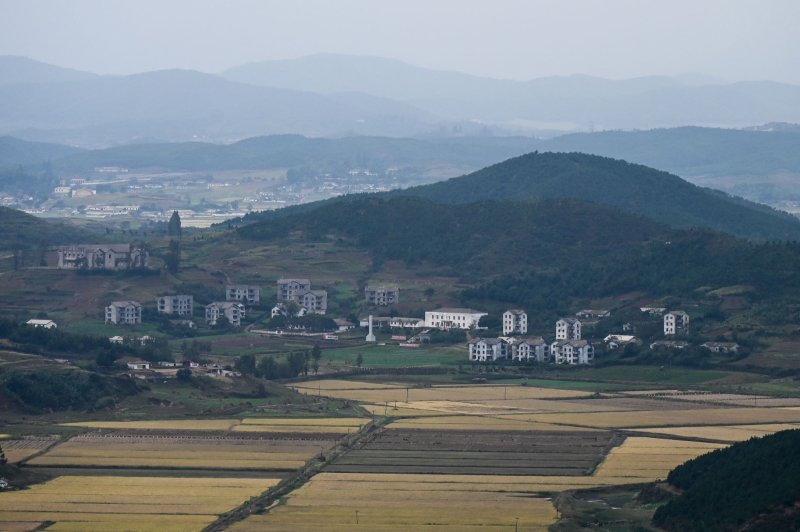North Korea, seen from across the border in Gimpo, South Korea, is suffering its worst food crisis since a mass famine of the 1990s, a new report by 38 North said. File Photo by Thomas Maresca/UPI |
License Photo
SEOUL, Jan. 20 (UPI) -- North Korea is undergoing the worst period of food insecurity it has faced since a mass famine devastated the country almost 30 years ago, a report by U.S.-based monitoring website 38 North said.
The report, published Thursday, analyzes data from sources including the U.N.'s World Food Program, the U.S. Department of Agriculture and independent news outlet Daily NK.
Citing economic mismanagement, the effects of the COVID-19 pandemic and rising global food prices, the report concludes that North Korea's "net grain balance has fallen below minimum human needs."
"Food availability has likely fallen below the bare minimum with regard to human needs, and on one metric, is at its worst since the country's famine in the 1990s," the report said. 38 North is published by Washington-based think tank The Stimson Center.
Estimates vary widely, but the famine of roughly 1994-98 -- referred to euphemistically as the "Arduous March" by North Korean leaders -- may have killed 1 million people, or 5% of the population at the time.
The report's data showed that the price of corn spiked higher than that of rice, the country's primary staple crop, after COVID-19 border closures in 2020, signifying serious household food shortages.
Restrictions on the domestic transport of grains during the pandemic also exacerbated the situation. In early 2021, North Korean food prices beginning to soar above global prices, a sign of supply breakdown.
"The evidence presented thus far points to a significant deterioration in living conditions and an ongoing complex humanitarian emergency with food insecurity at its core," the report said.
In April 2021, North Korean leader Kim Jong Un called for another "Arduous March" to overcome the deep economic hardships the country was facing.
However, Kim's regime has accelerated its nuclear and missile programs in recent years, diverting scarce resources to the defense budget despite worsening food insecurity.
Pyongyang fired more than 70 ballistic missiles last year, a record-setting pace, and Kim recently called for "an exponential increase" of the country's nuclear arsenal.
This week, the country's rubber-stamp parliament announced that defense sector spending would remain a top priority, accounting for 15.9% of North Korea's total budget in 2023.
The 38 North report suggests domestic economic reforms and a resolution of the nuclear issue, which would bring sanctions relief and a resumption of trade with the United States and its allies, could alleviate the crisis.
Pyongyang, however, has shown little inclination to change course despite the suffering of its citizens, even with international offers of humanitarian aid on the table.
"The diplomatic leverage conferred by the granting of aid seems to be low," the report said. "North Korea appears to be committed to its nuclear posture, and the lack of accountability allows the regime to prioritize its narrow militaristic goals to the detriment of its citizens' living standards."















